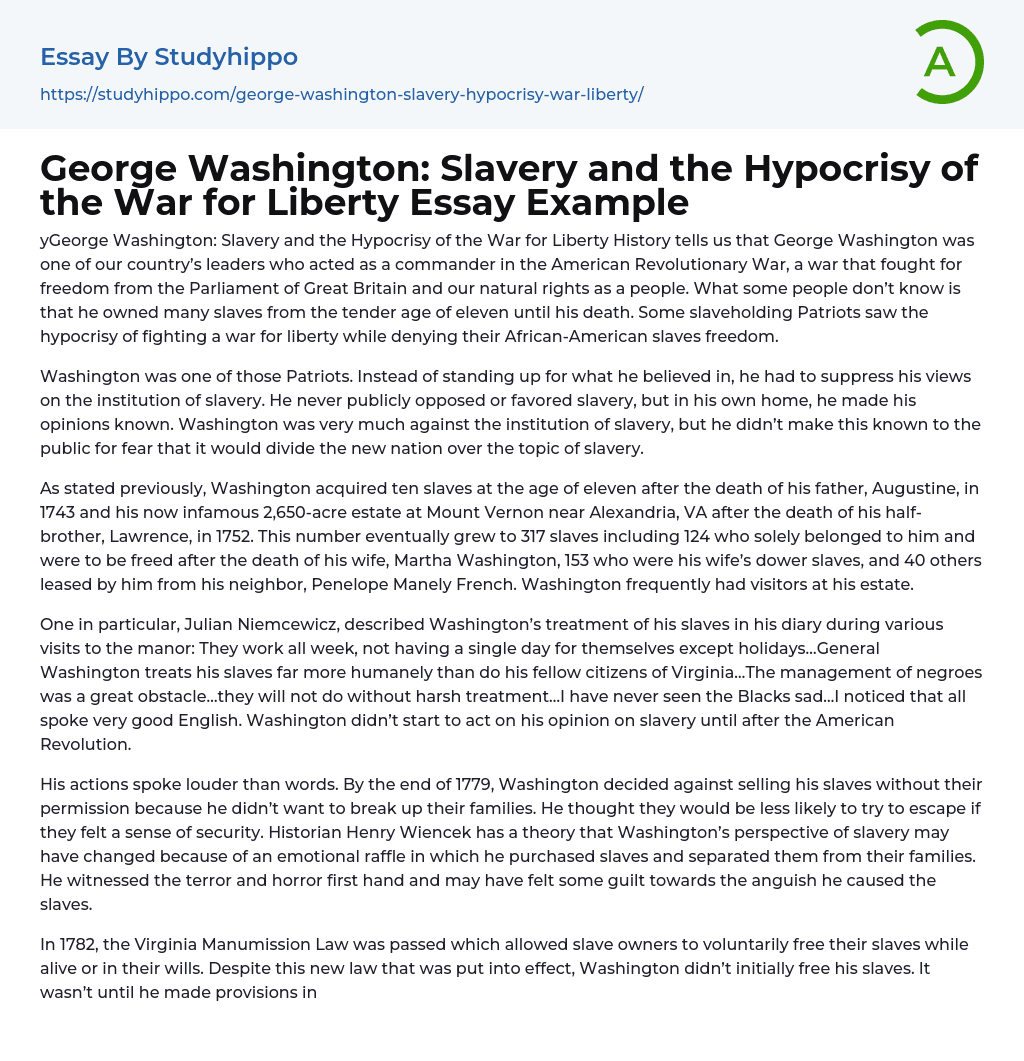

George Washington: Slavery and the Hypocrisy of the War for Liberty Essay Example
yGeorge Washington: Slavery and the Hypocrisy of the War for Liberty History tells us that George Washington was one of our country’s leaders who acted as a commander in the American Revolutionary War, a war that fought for freedom from the Parliament of Great Britain and our natural rights as a people. What some people don’t know is that he owned many slaves from the tender age of eleven until his death. Some slaveholding Patriots saw the hypocrisy of fighting a war for liberty while denying their African-American slaves freedom.
Washington was one of those Patriots. Instead of standing up for what he believed in, he had to suppress his views on the institution of slavery. He never publicly opposed or favored slavery, but in his own home, he made his opinions known. Washington was very much against the institutio
...n of slavery, but he didn’t make this known to the public for fear that it would divide the new nation over the topic of slavery.
As stated previously, Washington acquired ten slaves at the age of eleven after the death of his father, Augustine, in 1743 and his now infamous 2,650-acre estate at Mount Vernon near Alexandria, VA after the death of his half-brother, Lawrence, in 1752. This number eventually grew to 317 slaves including 124 who solely belonged to him and were to be freed after the death of his wife, Martha Washington, 153 who were his wife’s dower slaves, and 40 others leased by him from his neighbor, Penelope Manely French. Washington frequently had visitors at his estate.
One in particular, Julian Niemcewicz, described Washington’s treatment of his slaves in his diary during various visits to
the manor: They work all week, not having a single day for themselves except holidays…General Washington treats his slaves far more humanely than do his fellow citizens of Virginia…The management of negroes was a great obstacle…they will not do without harsh treatment…I have never seen the Blacks sad…I noticed that all spoke very good English. Washington didn’t start to act on his opinion on slavery until after the American Revolution.
His actions spoke louder than words. By the end of 1779, Washington decided against selling his slaves without their permission because he didn’t want to break up their families. He thought they would be less likely to try to escape if they felt a sense of security. Historian Henry Wiencek has a theory that Washington’s perspective of slavery may have changed because of an emotional raffle in which he purchased slaves and separated them from their families. He witnessed the terror and horror first hand and may have felt some guilt towards the anguish he caused the slaves.
In 1782, the Virginia Manumission Law was passed which allowed slave owners to voluntarily free their slaves while alive or in their wills. Despite this new law that was put into effect, Washington didn’t initially free his slaves. It wasn’t until he made provisions in his last will and testament that requested his slaves be freed upon the death of his wife, Martha. He chose not to free them until her death due to the intermarriages of his slaves and the dower slaves; he would not be able to include the dower slaves in his will because he did not hold them in his own right.
He also requested that
the younger and elderly slaves who were unable to support themselves “be comfortably clothed & fed” by his heirs. The younger slaves whose parents had passed or were unable to provide for them would “be bound by the Court until they shall arrive at the age of twenty-five years” and “be taught to read and write; and to be brought up to some useful occupation. ” After my examination of George Washington and slavery, I have concluded that Washington’s choice not to speak up for what he believed was very unfortunate.
Had he chosen to voice his opinions of slavery more directly, instead of neutrally, he might have changed the morale of the United States as we know it today. Although when another great president, Abraham Lincoln, spoke out against slavery, he was assassinated, Washington may have had more luck on the issue, in my opinion, because even though the nation was new and could be easily divided, it was also more impressionable and might have accepted the idea of abolishing slavery. All in all, Washington transformed from a conventional slaveholder into a lukewarm abolitionist by the time of his death in 1799.
- Slave Trade essays
- Abraham Lincoln essays
- Andrew Jackson essays
- Barack Obama essays
- Bill Clinton essays
- Donald Trump essays
- Franklin D. Roosevelt essays
- George W. Bush essays
- George Washington essays
- James Madison essays
- John F. Kennedy essays
- Lyndon B. Johnson essays
- Richard Nixon essays
- Theodore Roosevelt essays
- Thomas Jefferson essays
- Vice President essays
- Adaptation essays
- Adventure essays
- Adversity essays
- Aging essays
- Alcohol essays
- Barbie Doll essays
- Beauty essays
- Care essays
- Carpe diem essays
- Change essays
- Chess essays
- Chicken essays
- Choices essays
- Contrast essays
- Crops essays
- Development essays
- Dream essays
- Evil essays
- Experience essays
- Family essays
- Farm essays
- Fire essays
- First Love essays
- Focus essays
- Greed essays
- Hero essays
- Holiday essays
- House essays
- Housing essays
- Humility essays
- Humor essays
- Hypocrisy essays
- Integrity essays
- Law of Life essays



